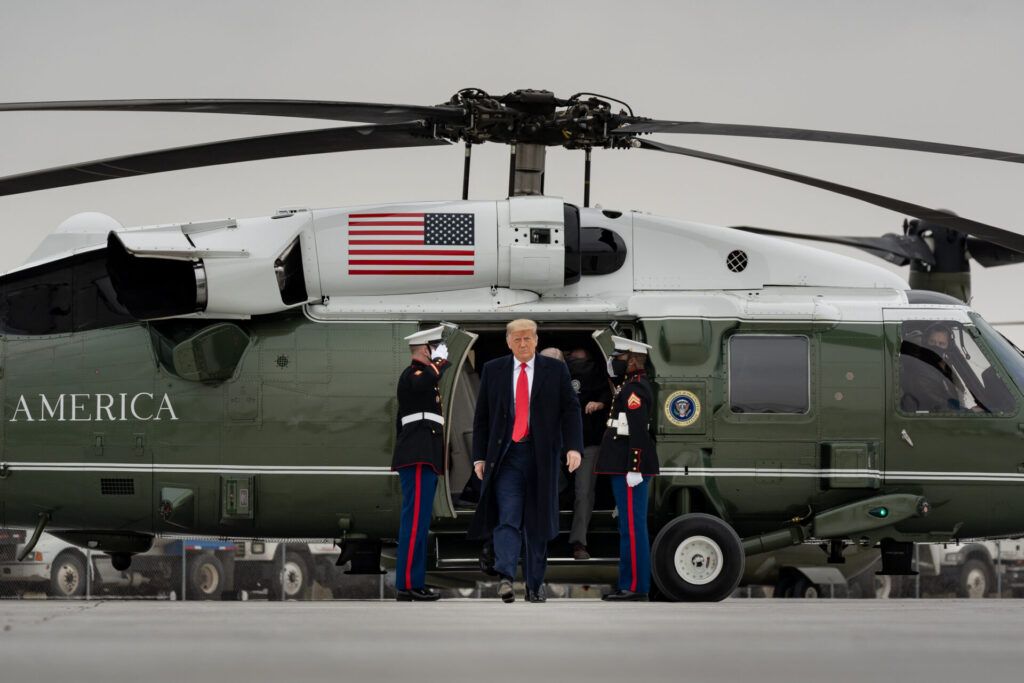Welcome to the American petrostate
By Michael E. Mann | November 7, 2024
 President Donald J. Trump disembarks Marine One at Valley International Airport in Harlingen, Texas Tuesday, Jan. 12, 2021. (Official White House Photo by Shealah Craighead)
President Donald J. Trump disembarks Marine One at Valley International Airport in Harlingen, Texas Tuesday, Jan. 12, 2021. (Official White House Photo by Shealah Craighead)
The United States is now a failed Democratic state. With the reelection of Donald Trump, a candidate who has flaunted his desire for autocracy—aided and abetted by a Republican-controlled Congress that will not constrain him with guardrails—the United States is now poised to become an authoritarian state ruled by plutocrats and fossil fuel interests. It is now, in short, a petrostate.
The oligarchs who control the Republican party do not intend to waste valuable time—as they did during Trump’s first term—in implementing their fossil fuel-driven agenda. They already have a blueprint—Project 2025—ready to go on day one, which will gut government agencies and programs focused on renewable energy and climate action and double down on fossil fuel infrastructure and production.
What does this mean for global climate action, on the eve of the 29th UN Conference of the Parties (COP29) to be held next week in Baku, Azerbaijan (yes, a petrostate), following yet another devastating summer of record heat waves, droughts, and wildfires and a devastating Atlantic hurricane season that continues on into November?
It means, for one thing, that other major polluters, like China—currently the world’s largest climate polluter (the United States leads in total cumulative greenhouse gas emissions)—will regard the United States as a bad actor with neither the capacity or willingness to make good on its previous climate commitments. Yes, there will be a US delegation in Baku representing the Biden administration, which has demonstrated a commitment to international climate policy engagement. But given that any climate-forward actions adopted by the United States will invariably be reversed in a few short months, China, India, the European Union, and other major industrial nations will not pay much attention to what US negotiators have to say.
It seems likely that the United States will, in short order, join an alliance of petrostate bad actors, including Russia and Saudi Arabia, to block meaningful progress in the COP process including, but not limited to, a commitment to phase out fossil fuels on the timeframe of the next decade or two that is required to avert a catastrophic 1.5-2 degrees Celsius (3-4 degrees Fahrenheit) warming of the planet.
Only a commitment by the United Nations to change COP rules in such a way as to prevent a small number of intransigent state actors from blocking an agreement can lead to meaningful progress. Thus far, however, the United Nations has shown no appetite for doing so.
I’ve long said that the obstacles to stabilizing warming below catastrophic levels aren’t physical or technological; they are entirely political in nature, and political obstacles can be overcome.
But what if they can’t?
Are we living the Fermi Paradox? The coalition of petrostates opposing international climate action now includes the world’s wealthiest and most powerful nation (perhaps in perpetuity, if Trump and the Republican Party make good on their pledge to dismantle American democracy). That coalition now rises to the level of seemingly unbreachable obstacle. Where then does that leave us?
Enrico Fermi, the famous physicist and Manhattan Project scientist, once asked his colleagues: If there are numerous intelligent civilizations in the universe—which one might expect given the vastness of space and the innumerable planetary systems in our own galaxy alone—why haven’t we heard from them? This casual query, thrown out in a lunchtime discussion, came to be known as the Fermi Paradox.
One of the more disconcerting of potential solutions that have been offered to the paradox (much pondered by luminaries like Carl Sagan) is that the lifetimes of technological civilizations are simply too short; they tend to extinguish themselves, perhaps through nuclear warfare or, more to the point in our case, fossil fuel-driven catastrophic climate change.
Perhaps civilizations tend to arrive at a critical juncture, a point in time that determines which of two possible paths they go down: one that is sustainable, one that is not. We find ourselves, to gratuitously quote the title of my most recent book, at a Fragile Moment—a moment where we were faced with just such a choice. And with the election of Donald Trump to a second term (something that I warned four years ago likely constitutes game over for the climate), it seems that we’ve willingly chosen to proceed headlong down the wrong path.
Is it true, as legendary American “Pogo” cartoonist Walt Kelly once famously wrote, that “we have met the enemy and he is us”? The quote feels especially prescient given that Kelly wrote these words for a poster commemorating the very first Earth Day in 1970—a time when it appeared we’d achieved a new level of public consciousness about the importance of environmental sustainability.
Also representative of the prevailing ethos of that time was the memorable final scene from the post-apocalyptic 1968 film Planet of the Apes, written by the great Rod Serling. The movie ends with a classic Serlingian twist of irony, wherein the surviving astronaut George Taylor, played by Charlton Heston, realizes the dystopian planet he’d crashed landed upon wasn’t in fact another planet—it was his home planet of Earth, and he had time-traveled 2,000 years into the future. Human civilization had been destroyed in a nuclear holocaust shortly after he and his crew had departed Earth. In its place was a ruthless world where human beings had degenerated into mute chattel herded by their Ape masters. Upon discovering the shattered remains of the Statue of Liberty, and coming to this chilling realization, Taylor falls to his knees and pounds the ground: “They finally, really did it. You maniacs! You blew it up! Damn you! Oh, goddamn you all to hell!”
I feel a lot like Taylor right now.
Narratives of resistance. At dark moments like this, I draw inspiration and strength from fictional narratives that ground us and channel our pain and sorrow.
None, for me, is more powerful than J.R.R. Tolkien’s Lord of the Rings. Especially resonant for me at this time is an exchange in the Peter Jackson films between Sam and Frodo, midway through their journey, as Frodo begins to doubt his resolve, and questions whether he is up to the seemingly hopeless task he has been given: to save Middle Earth by destroying the evil ring of power in the fires of Mount Doom:
Frodo: What are we holding onto, Sam?
Sam: That there’s some good in this world, Mr. Frodo … and it’s worth fighting for.”
We too must choose to do battle against the forces of darkness, fighting back against a malevolent movement that represents fascism, authoritarianism, racism, misogyny, and bigotry, a movement that uses antiscientific disinformation as its preferred weapon. We do this not because our success is guaranteed. Given the forces mobilized against us, we are clearly the underdog. No white wizard will come to our rescue. But we have truth and justice on our side. And the stakes simply couldn’t be greater. We continue to fight for a livable planet, for us, our children, and future generations. Because it’s worth fighting for.
Together, we make the world safer.
The Bulletin elevates expert voices above the noise. But as an independent nonprofit organization, our operations depend on the support of readers like you. Help us continue to deliver quality journalism that holds leaders accountable. Your support of our work at any level is important. In return, we promise our coverage will be understandable, influential, vigilant, solution-oriented, and fair-minded. Together we can make a difference.
Keywords: Fermi paradox, Trump administration, climate change, climate crisis, democracy, election 2024
Topics: Climate Change, Opinion
















Excellent, if sobering, piece. (It’s Kelly, by the way, not “Kelley”.)
Thanks for catching, fixed!
Imho, focus the next 4 yrs on private actions – where the state fails. Select and prepare a strong progressive leader (usually a male, Trump now won twice vs a woman).
On the bright side, with Elon in the mix we may see the continuation of adopting electric cars, especially around red states. He may even prevent another exit – the joker.
Doesn’t matter if we have electric cars if the electricity is being made by coal, oil or gas
No, The US$ is no longer a petrocurrency, read Jeff Rubin’s book, and until you do, all you think you know about world affairs is bogus and past-tense.
https://www.penguinrandomhouse.ca/books/714717/a-map-of-the-new-normal-by-jeff-rubin/9780735246119
Also, US$ is being knocked off being world reserve currency.
The US dollar is both the primary global reserve currency AND a petrodollar, as the US has been the largest producer of carbon for many years now, because of its fracking revolution.
The US$ skyrocketed after PUS#45/47 reelection in part because it is known that The Donald wants to”Drill. Baby, Drill!”.
Based on his foolish promise to deregulate many verboten carbon fields into allowing their exploitation asap.
It may also be a classic “pump & dump” stock market scam.
Like PUS#45/47 social media malarkey.